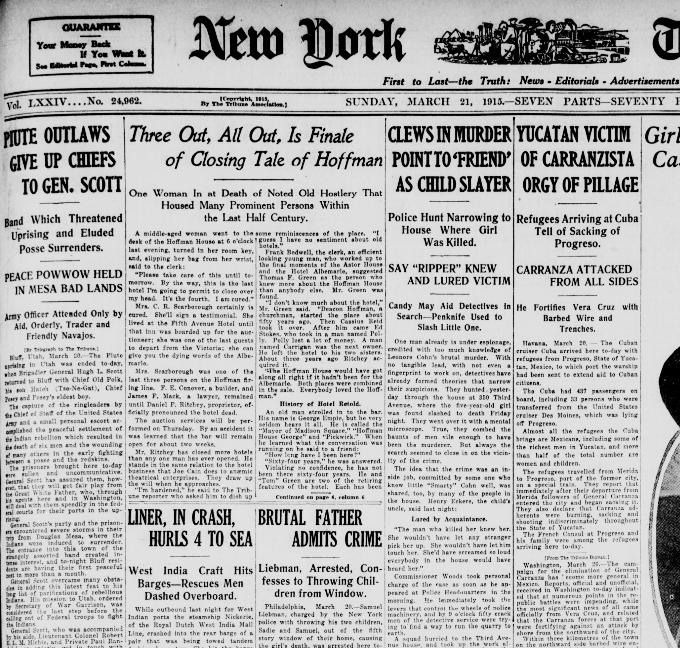|
Moderated by NW Okie! |
Volume 17 , Issue 92015Weekly eZine: (371 subscribers)Subscribe | Unsubscribe Using Desktop... |
100 Years Ago, 21 March 1915

One hundred years ago, 21 March 1915, Sunday, the New York Tribune reported: "Piute Outlaws Give Up Chiefs To Gen. Scott." The band which threatened uprising and eluded posse surrenders. Peace powwow held in Mesa Bad Lands. Army officer attended only by aid, orderly, trader and friendly Navajos.
Bluff, Utah, March 20 (1915) -- The Piute uprising in utah was ended back in March 1915 when Brigadier General Hugh L. Scott returned to Bluff with Chief Old Polk, his son Hatch (Tse-Ne-Gat), Chief Posey and Posey's eldest boy.
The capture of the ringleaders by the Chief of staff of the United States Army and a small personal escort accomplished the peaceful settlement of the Indian rebellion which resulted in the death of six men and the wounding of many others in the early fighting between a posse and the redskins.
The prisoners brought here were sullen and uncommunicative. General Scott had assured them, however, that they would get fair play from the Great White Father, who, through his agents here and in Washington, would deal with them speedily in the federal courts for their parts in the uprising.
General Scott's part and the prisoners encountered severe storms in their trip from Douglas Mesa, where the indians were induced to surrender. The entrance into this town of the strangely assorted band created intense interest, and that night Bluff residents were having their first peaceful rest in more than a month.
General Scott overcame many obstacles in adding this latest feat to his long list of pacifications of rebellious Indians. His mission to Utah, ordered by Secretary of War Garrison, was considered the last step before the calling out of Federal troops to fight the Indians.
General Scott, who was accompanied by his aide, Lieutenant Colonel Robert E. L. M. Michie,and Private Paul Randolph, an orderly, got in touch with the hostiles the Wednesday before through friendly Navajo Indian messengers sent out to find them.
The outlaws were encamped about seventy-five miles southwest of Bluff, in the washes and bAd Lands of Douglas Mesa. General Scott waited at Medicine Hat, an Indian trading post run by John Wetherill, for the reply of the renegades to his peace proffers.
The Navajo messengers told Chief Old Polk and Posey that the Big War Chief, the Great White Father (President Wilson) had come to smoke a pipe of peace with them and talk over the grievances with the Indians.
The Indians were at first reluctant to believe this, thinking it a trap to lead them into the clutches of the posse of Marshal Nebeker, with which they had a three days' battle. After many reassurances the chief finally consented to pow-wow with General Scott, the meeting place to be several miles from Medicine Hat.
As a precautionary measure against being trapped, the Piutes scouted the ground several miles in advance of their chiefs, as the latter went toward the meeting place. Finally satisfying themselves that General Scott was accompanied only be a small party, the chiefs went forward to meet him.
At the pow-wow were General Scott, Lieutenant colonel Michie, the orderly, Wetherill, and overall friendly Navajo Indians.
While General Scott and the chiefs sat in consultation, number of Piute and Ute warriors from the renegade band took up advantageous positions on the tops of nearby buttes, in order to prevent a surprise.
General Scott listened to the arguments of Old Polk, Hatch and Posey that they had resisted arrest by the force under United States Marshall Nebeker because they did not believe they could get justice in the White Man's court. "White man's justice, all for white man, none of Indian," was the way they put it.
Old Polk and Hatch said they had been willing to surrender if the authorities would change the place of trial of Tse-Ne-Gat (Hatch) from the place of the murder with which he was charged to some other locality. They did not want to fight, but they would fight to the last and die in the open rather than be thrown in jail and suffer injustice.
General Scott assured the Indians that they would get justice and a fair trial in the federal court if they would surrender themselves without further violence. He told them that the Great White Father was not willing to make war on his wards. He would seek a peaceful settlement first, and had asked General Scott, the Indians' friend to come and talk over some peaceable way of settling the trouble.
He further explained that it was their last chance to settle the difficulty, unless they wanted to die. If they would not listen to his peace overtures the Great White Father would lose patience and order hundreds of his soldiers into the field to either capture or shoot them.
The Indians, after a talk among themselves, told General Scott that they would surrender to him if he would promise to see that they were justly treated. He assured them he would do what they asked. The Indians then proffered him their arms, but he refused to accept them.
Arrangements were made for Old Polk, Hatch, Posey and his son to accompany General Scott back to Bluff. It was also arranged that the remainder of the hostiles were to come into Bluff and surrender as soon as they could break camp and make the march.
| View or Add Comments (0 Comments)
| Receive
updates ( subscribers) |
Unsubscribe
| © . Linda Mcgill Wagner - began © 1999 Contact Me | |
